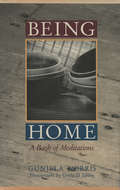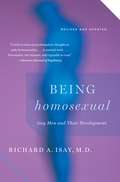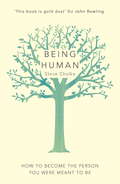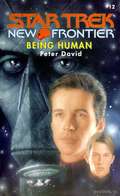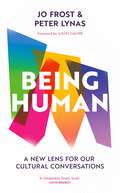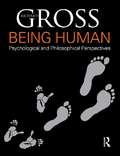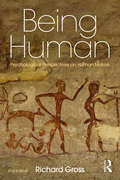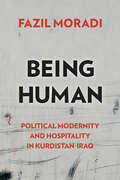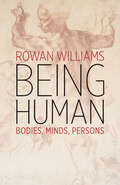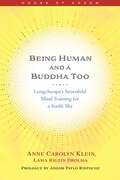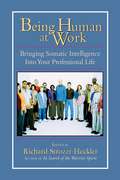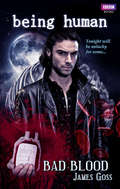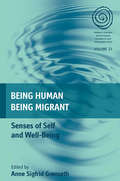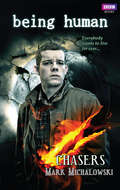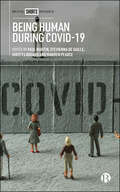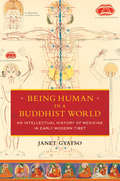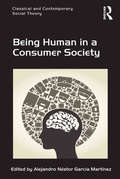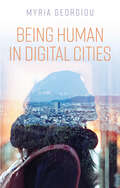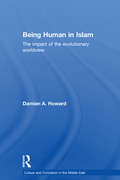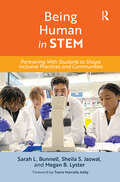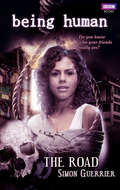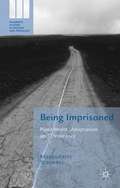- Table View
- List View
Being Home: A Book of Meditations
by Greta D. Sibley Gunilla NorrisThrough 40 eloquent prayers and small simple photographs that mirror and interpret the text, Being Home is a celebration of mindfulness. As M. Scott Peck put it, "This is simply the best book I know on the subject of the sacrament of the present moment, and a great work of devotional literature." 43 duotone photographs..
Being Homosexual: Gay Men and Their Development
by Richard IsayRichard Isay was the first person to challenge the homophobia of the psychoanalytic community and prove, through his own story and those of his patients, that homosexuality is an innate characteristic rather than a learned pathology. Now revised and updated for the 21st-century, the groundbreaking Being Homosexual carries the reader through the main developmental stages in the gay male's life cycle from the initial awareness of same-sex impulses to coming out, forming friendships with other gay men, and a mature integration of one's sexual identity. An invaluable resource for gay men, Being Homosexual is a compassionate and powerful work.From the Trade Paperback edition.
Being Human: How to become the person you were meant to be
by Steve Chalke'Your life is precious - a precious gift. It is sacred; every moment of it. The opportunity to live rather than sleepwalk through our days belongs to us. This book is a call to wake up. It is a call to each one of us; to wake up, to live before we die.' It's easy to sleepwalk through life without ever really considering what we're here for. But life presents us with continual opportunities to wake up - and to think about not just what we do with our lives, but who we become while living them. Ultimately it is the story that we believe about ourselves, our lives and the world around us that will shape us - for better or for worse. So where do we find a good story - a convincing narrative that makes sense of it all? Steve Chalke suggests that Jesus' good news about the kingdom of God - a practical, lived-out expression of God's plans for the world - is the best story for us to find ourselves in. Each one of us is called to be part of the drama of the coming kingdom, and it's in this that we find a practical spirituality that helps shape our lives into everything we were meant to be.
Being Human: How to become the person you were meant to be
by Steve Chalke'Your life is precious - a precious gift. It is sacred; every moment of it. The opportunity to live rather than sleepwalk through our days belongs to us. This book is a call to wake up. It is a call to each one of us; to wake up, to live before we die.'It's easy to sleepwalk through life without ever really considering what we're here for. But life presents us with continual opportunities to wake up - and to think about not just what we do with our lives, but who we become while living them. Ultimately it is the story that we believe about ourselves, our lives and the world around us that will shape us - for better or for worse. So where do we find a good story - a convincing narrative that makes sense of it all?Steve Chalke suggests that Jesus' good news about the kingdom of God - a practical, lived-out expression of God's plans for the world - is the best story for us to find ourselves in. Each one of us is called to be part of the drama of the coming kingdom, and it's in this that we find a practical spirituality that helps shape our lives into everything we were meant to be.
Being Human: Star Trek New Frontier (Star Trek: The Next Generation #No. 12)
by Peter DavidAt last - the answer to the secret that New Frontier fans have been waiting for: the supernatural origins of USS Excalibur's navigator Mark McHenry. Always displaying talents far beyond those of mortal men, McHenry discovers the source of his power reaches back incredibly to ancient Greece - and to specific events from Star Trek: The Original Series.
Being Human: A new lens for our cultural conversations
by Jo Frost Peter Lynas'Being Human masterfully reorientates us towards the only story that ultimately makes sense of who we are ... A remarkably timely book' Justin Brierley'Practical, prayerful and ambitious. A Gospel-infused, wide-angle lens on contemporary society.'Jill Duff, Anglican Bishop of Lancaster'A valuable toolkit for church leaders, to help them build confidence in their members, to share the story of Jesus and his kingdom.'Les Isaac OBE, President, Ascension Trust'A great book about one of the most important but confusing questions of our time.'Professor Iain Provan, author of Cuckoos in our Nest: Truth and Lies about Being HumanWho am I? Does my life matter? What will make me happy?In different ways and at different moments we all ask life's big questions about what it means to be human. But in our fast-paced, rapidly changing and often exhausting society, our cultural stories struggle to provide us with good answers. Whether on issues of gender identity or AI, climate change or racial injustice, our individual solutions to life's big challenges can often end in deep division and broken relationships. But there is another way. Being Human offers a new lens - a new way to engage with our cultural conversations using four key aspects of humanity: significance, connection, presence and participation. Digging into the foundations of our cultural stories, authors Jo Frost and Peter Lynas expose the cracks in our culture's understanding of what it means to be human. By contrasting our cultural narratives with the story of the Bible, we can see how cultural truths have been fractured and isolated from the fullness and richness of who God is and who God created us to be, and come to recognise that only in Jesus can we live truly fully human lives. Being Human is a refreshingly clear and engaging guide for everyone who wants to live out and share the good, true and beautiful biblical vision of what it is to be human. Peter and Jo co-lead the Being Human project, an initiative from the Evangelical Alliance, helping everyday Christians live out and share the biblical vision of what it means to be human.
Being Human: A new lens for our cultural conversations
by Jo Frost Peter Lynas'Being Human masterfully reorientates us towards the only story that ultimately makes sense of who we are ... A remarkably timely book' Justin Brierley'Practical, prayerful and ambitious. A Gospel-infused, wide-angle lens on contemporary society.'Jill Duff, Anglican Bishop of Lancaster'A valuable toolkit for church leaders, to help them build confidence in their members, to share the story of Jesus and his kingdom.'Les Isaac OBE, President, Ascension Trust'A great book about one of the most important but confusing questions of our time.'Professor Iain Provan, author of Cuckoos in our Nest: Truth and Lies about Being HumanWho am I? Does my life matter? What will make me happy?In different ways and at different moments we all ask life's big questions about what it means to be human. But in our fast-paced, rapidly changing and often exhausting society, our cultural stories struggle to provide us with good answers. Whether on issues of gender identity or AI, climate change or racial injustice, our individual solutions to life's big challenges can often end in deep division and broken relationships. But there is another way. Being Human offers a new lens - a new way to engage with our cultural conversations using four key aspects of humanity: significance, connection, presence and participation. Digging into the foundations of our cultural stories, authors Jo Frost and Peter Lynas expose the cracks in our culture's understanding of what it means to be human. By contrasting our cultural narratives with the story of the Bible, we can see how cultural truths have been fractured and isolated from the fullness and richness of who God is and who God created us to be, and come to recognise that only in Jesus can we live truly fully human lives. Being Human is a refreshingly clear and engaging guide for everyone who wants to live out and share the good, true and beautiful biblical vision of what it is to be human. Peter and Jo co-lead the Being Human project, an initiative from the Evangelical Alliance, helping everyday Christians live out and share the biblical vision of what it means to be human.
Being Human: Psychological and Philosophical Perspectives
by Richard GrossRichard Gross turns his expert eye to the psychology of human nature in a contemplative account encompassing cognition, consciousness, language, time perception, sense of mortality and human society. This book will help you to consider the unique aspects of being human and to understand the biological underpinnings for the intriguing and distinct behaviours and experiences common to human beings.The book is enhanced throughout by: - its logical arrangement of topics, with key questions, issues for additional focus and reflection points highlighted throughout- useful chapter introductions and summaries to provide clarity and insight- diagrams to help explain difficult concepts- detailed selection of references and useful sources including works from the fields of psychology, philosophy, religion and literatureThis book is essential reading for students of psychology and related disciplines as well as general readers seeking insights into one of the most enduring questions to have faced humankind throughout history.
Being Human: Psychological Perspectives on Human Nature
by Richard GrossWhile there may be no one single characteristic that differentiates humans as a species, it is the combination of differences from other species that makes us unique. The new edition of Being Human examines the psychology of being human through exploring different psychological traditions alongside philosophy and evolutionary theory, covering themes such as culture, cognition, language, morality, and society. Our nature – or ‘essence’ – is something that has preoccupied human beings throughout our history, beginning with philosophy and religion, and continuing through the biological, social, and psychological sciences. Being Human begins by describing some of the major philosophical accounts of human nature, from Ancient Greek philosophers, such as Plato and Aristotle, to major British and Continental philosophers, such as Locke and Nietzsche. The book considers religious accounts of human nature, with their focus on the nature of good and evil, and scientific accounts of genetics and the brain, which underpin the distinctively human cognitive ability of language. Attention then turns to the ideas of the behaviourists, such as Skinner, Freud, and other psychodynamic psychologists, and humanistic-phenomenological psychologists, such as Maslow. Finally, human culture is discussed as the ultimate defining characteristic of human beings: culture represents our ‘natural habitat’ and what defines us as a species. This updated second edition includes increased coverage of social psychology and has a broader scope, in order to identify the defining characteristics of human beings. With reference to current psychological research and philosophical material, this is fascinating reading for students of psychology, philosophy, and the social sciences.
Being Human: Political Modernity and Hospitality in Kurdistan-Iraq (Genocide, Political Violence, Human Rights)
by Fazil MoradiThe Iraqi Baʿth state’s Anfāl operations (1987-1991) is one of the twentieth century’s ultimate acts of destruction of the possibility of being human. It remains the first and only crime of state in the Middle East to be tried under the 1948 UN Genocide Convention, the 1950 Nuremberg Principles, and the 1969 Iraqi Penal Code and to be recognized as genocide, crimes against humanity, and war crimes in Baghdad between 2006 and 2007. Being Human: Political Modernity and Hospitality in Kurdistan-Iraq offers an unprecedented pathway to the study of political violence. It is a sweeping work of anthropological hospitality, returning to the Anfāl operations as the violence of political modernity only to turn to the human survivors’ hospitality and acts of translation—testimonial narratives, law, politics, archive, poetry, artworks, museums, memorials, symbolic cemeteries, and infinite pursuit of justice in the Kurdistan Region of Iraq. Being Human gathers together social sciences, humanities, and the arts to understand modernity's violence and its living on.
Being Human: Bodies, Minds, Persons
by Rowan WilliamsWhat is consciousness? Is the mind a machine? What makes each of us a person? How do our bodies relate to our minds?In this deeply engaging exploration of what it means to be human, Rowan Williams addresses these frequently asked questions with lucid meditations that draw from findings in neuroscience, philosophy, psychology, and literature. Then he presses on to ask, Might faith be necessary to human flourishing? If so, why? And how can a traditional Christian practice—namely, silence—help us advance on the path to human maturity?The book ends with a brief but profound meditation on Christ’s ascension, inviting readers to consider how, through Jesus, our humanity in all its variety and vulnerability has been transfigured and taken into the heart of the divine life.Being Human is a book that readers of all religious persuasions will find both challenging and highly rewarding. Questions at the end of each chapter encourage personal reflection or group discussion.
Being Human and a Buddha Too: Longchenpa's Seven Trainings for a Sunlit Sky
by Anne KleinIn writing that sparkles and inspires, Anne Klein (Lama Rigzin Drolma) shows us how to liberate our buddha nature to be both human and a buddha too.This first volume in the House of Adzom series centers on Longchenpa&’s seven trainings in bodhicitta, our awakened mind, the ultimate purpose of our practice and training. Anne Klein&’s original composition masterfully weaves in Adzom Paylo Rinpoche&’s commentary and Jigme Lingpa&’s five pith practices and commentary on the trainings, in keeping with Longchenpa&’s skillful integration of sutra, tantra, and Dzogchen, to resolve our most challenging questions about what awakening involves and how it relates to the truth of our human situation right now. As foundational teachings for Dzogchen practitioners, the seven trainings are framed as contemplations on impermanence, the adventitiousness of happiness and its short duration, the multiple causes of death, the meaninglessness of our worldly activities, reliance on the Buddha&’s good qualities, the teacher&’s pith instructions, and, ultimately, nonconceptual meditation on bliss and emptiness, clarity and emptiness, and reality itself.
Being Human at Work: Bringing Somatic Intelligence into Your Professional Life
by Richard Strozzi-HecklerThis anthology of interdisciplinary writings looks at the integration of mind, body, and spirit as it plays out in the workplace--whether in birth coaching, teaching parents, assisting the terminally ill, or working in the military, the classroom, or the corporation. These essays reveal what gets in the way of our humanity in the work world and how to rediscover that humanity. Written by leading professionals in business, education, medicine, technology, finance, psychology, and the military, this collection of essays explores how reconnecting with one's humanity can result in true leadership in any field.
Being Human: Bad Blood
by James GossOne of Annie's oldest friends has come looking for her - and what's more amazing is that she's found her. Denise is the ultimate party girl, and she's determined to bring Annie out of her shell. Mitchell is delighted, but George really thinks the last thing they need to do is to go out and meet new people.Annie and Denise throw themselves into organising a Bingo night at the local sports hall - after all, it's for charity, and what's not to love about having a good time? But why is Denise back in town? Why have Bristol's vampires suddenly started hanging around wherever they go? And why does George get the feeling that Bingo night is going to go horribly, horribly wrong?Featuring Mitchell, George and Annie, as played by Aidan Turner, Russell Tovey and Lenora Chichlow in the hit series created by Toby Whithouse for BBC Television
Being Human, Being Migrant: Senses of Self and Well-Being
by Anne Sigfrid GrønsethMigrant experiences accentuate general aspects of the human condition. Therefore, this volume explores migrant's movements not only as geographical movements from here to there but also as movements that constitute an embodied, cognitive, and existential experience of living "in between" or on the "borderlands" between differently figured life-worlds. Focusing on memories, nostalgia, the here-and-now social experiences of daily living, and the hopes and dreams for the future, the volume demonstrates how all interact in migrants' and refugees' experience of identity and quest for well-being.
Being Human: Chasers
by Mark MichalowskiGeorge's friend, Kaz, arrives at the flat with a staggering request: she and her partner Gail want to have a child, and they'd like George to be the father. George is warming to the idea - he's always wanted kids, and he can be as involved in the baby's life as he wishes - but he is wary: what if his condition is genetic?Mitchell and Annie don't approve of the new plan, but Mitchell is wrestling with a difficult decision of his own. A patient at the hospital, Leo, is surprisingly good company for a pasty older bloke who believes the 1980s were a golden age. But he seems a little too interested in Mitchell's history - and he has a surprising request of his own in store for his new friend...Featuring Mitchell, George and Annie, as played by Aidan Turner, Russell Tovey and Lenora Crichlow in the hit series created by Toby Whithouse for BBC Television
Being Human During COVID-19
by Paul Martin, Stevienna de Saille, Kirsty Liddiard and Warren PearceCutting across disciplines from science and technology studies to the arts and humanities, this thought-provoking collection engages with key issues of social exclusion, inequality, power and knowledge in the context of COVID-19. The authors use the crisis as a lens to explore the contours of contemporary societies and lay bare the ways in which orthodox conceptions of the human condition can benefit a privileged few. Highlighting the lived experiences of marginalized groups from around the world, this is a boundary-spanning critical intervention to ongoing debates about the pandemic. It presents new ways of thinking in public policy, culture and the economy, and points the way forward to a more equitable and inclusive human future.
Being Human in a Buddhist World: An Intellectual History of Medicine in Early Modern Tibet
by Janet GyatsoCritically exploring medical thought in a cultural milieu with no discernible influence from the European Enlightenment, Being Human in a Buddhist World reveals an otherwise unnoticed intersection of early modern sensibilities and religious values in traditional Tibetan medicine. It further studies the adaptation of Buddhist concepts and values to medical concerns and suggests important dimensions of Buddhism's role in the development of Asian and global civilization.Through its unique focus and sophisticated reading of source materials, Being Human adds a crucial chapter in the larger historiography of science and religion. The book opens with the bold achievements in Tibetan medical illustration, commentary, and institution building during the period of the Fifth Dalai Lama and his regent, Desi Sangye Gyatso, then looks back to the work of earlier thinkers, tracing a strategically astute dialectic between scriptural and empirical authority on questions of history and the nature of human anatomy. It follows key differences between medicine and Buddhism in attitudes toward gender and sex and the moral character of the physician, who had to serve both the patient's and the practitioner's well-being. Being Human in a Buddhist World ultimately finds that Tibetan medical scholars absorbed ethical and epistemological categories from Buddhism yet shied away from ideal systems and absolutes, instead embracing the imperfectability of the human condition.
Being Human in a Buddhist World: An Intellectual History of Medicine in Early Modern Tibet
by Janet GyatsoA rare account of the effort by traditional Tibetan medical scholars to reconcile their religious worldview with an impulse toward greater scientific accountability and precision.
Being Human in a Consumer Society (Classical and Contemporary Social Theory)
by Alejandro Néstor MartínezThis book offers a new perspective on sociological studies of the consumer society, introducing neglected normative questions relating to the good life and human flourishing - subjects more commonly discussed in fields of moral, political, and social philosophy. With attention to a wide range of subjects, including postemotional law and responsibility, dehumanised consumption and prosumerism, fashion, embodiment, conspicuous consumption, and sustainability, this book analyzes the structural and cultural transformations that can be identified in consumer society. It also offers a critical - but not pessimistic - view of the important question of whether consumption is leading to an increasing isolation, individualization or commodification of human beings, suggesting an analytical framework for understanding consumer culture and human praxis. Bringing together work from across disciplines by scholars in the US, Europe, and the UK to engage with questions concerning our globalized and globalizing world, where consumerism is a keystone for understanding our contemporary culture and its social structures, Being Human in a Consumer Society will appeal to scholars and students of sociology, social theory, and contemporary philosophy.
Being Human in Digital Cities
by Myria GeorgiouHow is life in digital cities changing what it means to be human?In this perceptive book, Myria Georgiou sets out to investigate the new configuration of social order that is taking shape in today’s cities. Although routed through extractive datafication, compulsive connectivity, and regulatory AI technologies, this digital order nonetheless displaces technocentrism and instead promotes new visions of humanism, all in the name of freedom, diversity, and sustainability. But the digital order emerges in the midst of neoliberal instability and crises, resulting in a plurality of contrasting responses to securing digitally mediated human progress. While corporate, media, and state actors mobilize such positive sociotechnical imaginaries to promise digitally mediated human progress, urban citizens and social movements propose alternative pathways to autonomy and dignity through and sometimes against digital technologies. Investigating the dynamic workings of technology and power from a transnational and comparative perspective, this book reveals the contradictory claims and struggles for the future of digital cities and their humanity. In doing so, it will enrich understandings of digital urbanism, critical data studies, and critical humanist studies.
Being Human in Islam: The Impact of the Evolutionary Worldview (Culture and Civilization in the Middle East)
by Damian HowardIslamic anthropology is relatively seldom treated as a particular concern even though much of the contemporary debate on the modernisation of Islam, its acceptance of human rights and democracy, makes implicit assumptions about the way Muslims conceive of the human being. This book explores how the spread of evolutionary theory has affected the beliefs of contemporary Muslims regarding human identity, capacity and destiny. In his systematic treatment of the impact of evolutionary ideas on modern Islam, Damian Howard surveys several branches of Muslim thought. Muslim responses to the crisis of the religious imagination presented by the evolutionary worldview fall into four different forms, incorporating traditional and modern notions. The book evaluates the content, influence and success of these four forms, asking how Muslims might now proceed to address the profound challenges which evolutionary theory poses to the effective reconstruction of their religious thought. Drawing fascinating parallels with developments in the world of Christian theology which will help understanding between people of the two religions, the author reflects on the question of how Muslims can come to terms with the modern world. A valuable addition to the literature on contemporary Islamic thought, this book will also interest students and scholars of religion and modernity, the history and philosophy of science, and evolutionary theory.
Being Human in STEM: Partnering with Students to Shape Inclusive Practices and Communities
by Sarah L. Bunnell Sheila S. Jaswal Megan B. LysterFor all STEM faculty, chairs, administrators, and faculty developers who work to support students’ learning and thriving in STEM – especially those students who have felt unwelcome and unsupported in their past STEM experiences – this book offers sustainable strategies that are now being widely adopted to create inclusive environments in undergraduate STEM classes and programs. Further, this book presents a framework for partnering with students to collaboratively envision how STEM can be a space that fosters a sense of belonging for, and promotes the success of, all individuals in STEM. This book presents the Being Human in STEM Initiative, or HSTEM, as a model for challenging the assumptions we make, and how we communicate to students, about who belongs and who can thrive in STEM. This work arose out of a time of conflict at Amherst College: A four-day sit-in, protesting in support of the Black Lives Matter movement and bringing attention to related experiences of exclusion and marginalization that minoritized students experienced on campus. What emerged from that conflict has been transformative for the college, its students, and for its faculty and staff. In this book, the authors share how the HSTEM course came into being, offer a course overview, readings, and resources for developing an HSTEM course at your own institution, provide recommendations for evaluating the multi-level impact of inclusive change initiatives, and profile models of how the HSTEM course has been adapted at colleges and universities across the country. In addition to providing a road map for developing your own HSTEM course, the authors articulate ways that you can make any course or institutional structure more inclusive through active listening and validation, and through reflective practice and partnership, to progressively make incremental and sustainable changes in STEM education. Through listening and reflecting, the model facilitates uncovering the disconnects that can impede inclusivity in our classrooms and laboratories. While the authors offer a proven process and model for change, originally motivated by the urgent need to respond to students’ demands, they recognize that larger institutional culture shifts require the identification and commitment to common values, a shared sense of purpose in the work of change, and the provision of agency and resources to individuals tasked with making change happen. How might we shift institutional STEM culture? The HSTEM model provides one solution: By reflecting on our own lived experiences and identities, engaging with the literature on the factors that enhance and limit full inclusion in STEM, and partnering with students to identify actionable ways to bring about sustainable change in our scientific communities, we can all work towards creating a more inclusive, and human, STEM ecosystem.Each chapter opens with a set of guiding reflective questions to help you connect these ideas, frameworks, and strategies to your own teaching and institutional context. While each chapter builds on the previous ideas and frameworks, the book can also be used as a resource to identify a just-in-time strategy to address particular questions you may have about making your teaching more inclusive. The appendices offer an array of Facilitator Guides, each of which outlines a student-endorsed exercise, based on the pedagogical literature, that can foster a sense of belonging and inclusion in your classrooms and laboratory spaces.
Being Human: The Road
by Simon GuerrierAnnie has learned quite a bit about her new friend Gemma: she's from Bristol, she used to work in a pharmacy, and she's never forgiven herself for the suicide of her teenage son. She also died ten years ago and doesn't know why she's come back through that door.Perhaps it has something to do with the new road they're building through the rundown part of town. The plans are sparking protests, and Annie knows those derelict houses hold a secret in Gemma's past. Will stopping the demolition help Gemma be at peace again? Annie, George and Mitchell get involved in the road protest, but they're more concerned by mysterious deaths at the hospital. Deaths that have also attracted the attention of the new Hospital Administrator...Featuring Mitchell, George and Annie, as played by Aidan Turner, Russell Tovey and Lenora Crichlow in the hit series created by Toby Whithouse for BBC Television
Being Imprisoned
by Marguerite SchinkelExploring the way in which criminal punishment is interpreted and narrated by offenders, this book examines the meaning offenders ascribe to their sentence and the consequences of this for future desistance.
